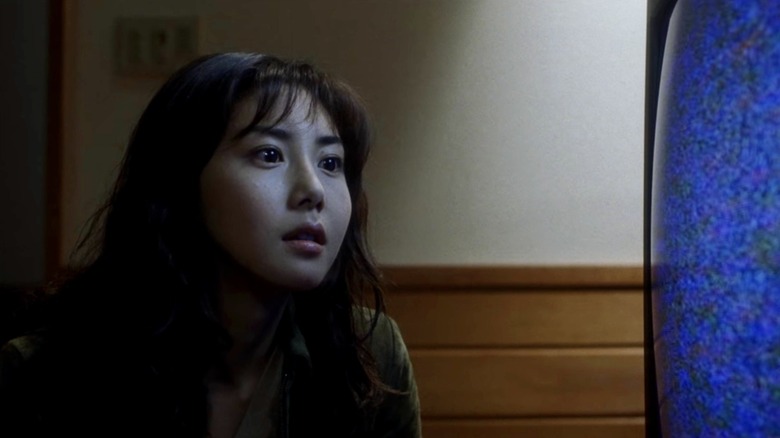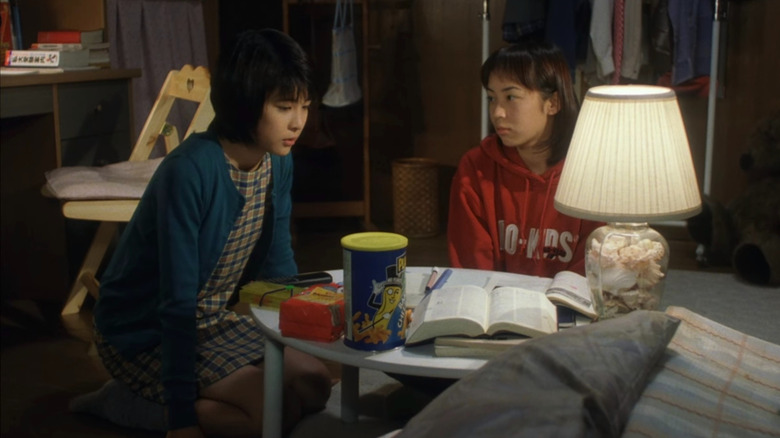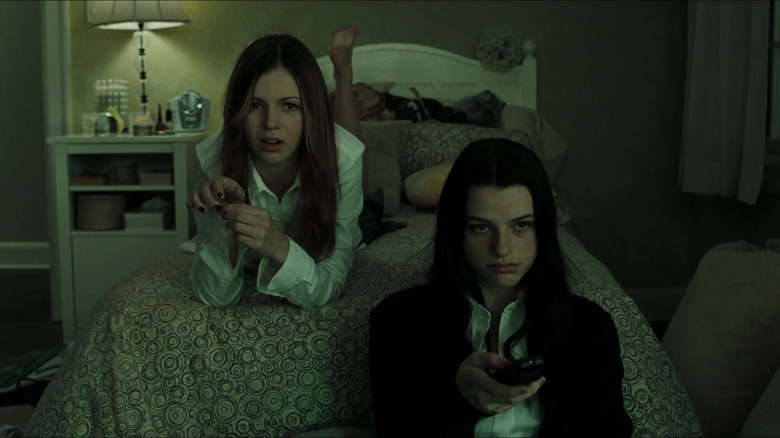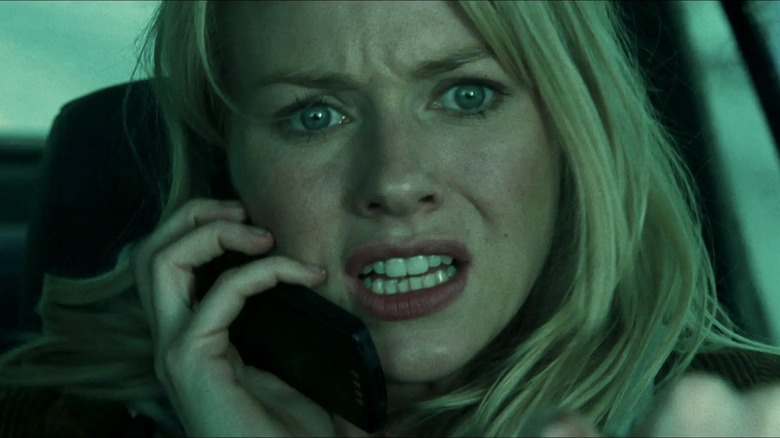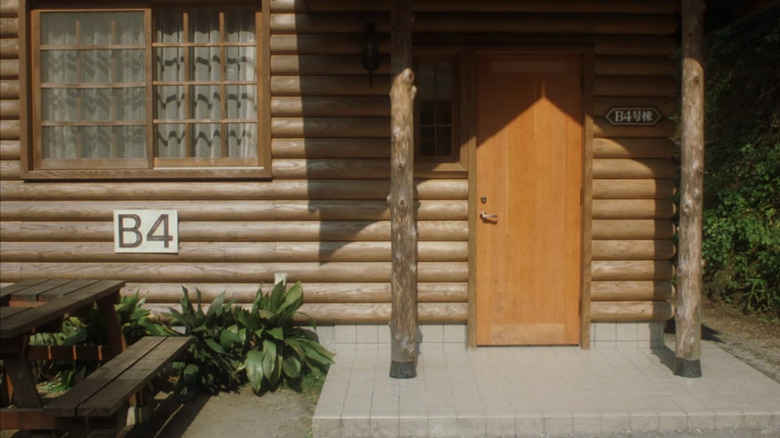The Daily Stream: Ringu And The Ring Open With Fake-Outs That Signpost That Shock Ending
(Welcome to The Daily Stream, an ongoing series in which the /Film team shares what they've been watching, why it's worth checking out, and where you can stream it.)
The Movies: "Ringu" and "The Ring"
Where You Can Stream Them: AMC+ or Shudder ("Ringu"), Paramount+ ("The Ring")
The Pitch: A newspaper reporter and single mom investigates a cursed videotape that results in the death of anyone who watches it after seven days.
Why They're Essential Viewing: When it comes to "Ringu" and "The Ring," I prefer not to play any "which is better" games. Like the deadly VHS cassette at the heart of this horror franchise, both movies are links in a kind of multimedia chain letter, which has perpetuated itself for over 30 years, ever since the publication of Koji Suzuki's 1991 novel "Ring." They're still making Sadako movies in Japan, where "Sadako DX" is scheduled for release just before Halloween, and where Hideo Nakata's 1998 film, "Ringu," was not the first adaptation of Suzuki's book. It came three years after a TV movie version, but the fact that it preceded Gore Verbinski's 2002 remake and a score of other Hollywood J-horror retreads left some purists with a residual distaste for "The Ring."
The irony is, "The Ring" was such a huge hit internationally that, even in Japan, it fared slightly better at the box office than "Ringu." Suzuki's prose, meanwhile, brings its own things to the table, as do each of these movies. They're not exactly unknown films, however, so what I'd like to do here is zero in on a specific thing I noticed as I was rewatching them recently. It relates to how the opening scene in "Ringu" and "The Ring" helps set up the famous twist at the end of both movies.
Ringu opening scene
The first line of dialogue in "Ringu" launches us right into the urban legend of a Tokyo boy on a family trip to Izu, who mistakenly recorded a blank TV channel, only to see a woman onscreen and receive a phone call telling him he'd die in a week. Masami (Hitomi Sato) relates the story with great gusto, relishing with laughter as she says, "And a week later, the boy died!"
Her friend Tomoko (Yuko Takekuchi) takes the story seriously, as something similar happened to her and her friends — coincidentally, a week prior. The mood in Tomoko's bedroom, which carries a stillness without music, grows more dire and dour until she appears to renege on her claims and say it was all a joke.
This is the first fake-out. The girls giggle and roll around on the floor, and it lets the audience breathe and think everything's going to be alright. Then, the phone rings, and things turns serious again.
It's all true; Tomoko wasn't lying about seeing a weird video and receiving an apparent prank call a week ago. Tension is thick as the ringing persists and the girls run downstairs to answer the phone.
As it turns out, it's only Tomoko's mother calling. The girls are relieved, and so is the audience. This is the second fake-out.
You know how it ends. Satisfied they are safe now, Masami heads to the bathroom, leaving Tomoko on her own in the kitchen. The TV suddenly turns on of its own accord, and after Tomoko shuts it off, the sound of some staticky, buzzing presence encroaches on her from behind.
She's afraid to even turn around, and when she does, her fears are not unfounded this time. Something's there, and it catches her in a photo-negative freeze frame.
The Ring opening scene
"The Ring" begins in a slightly different manner, as Katie (Amber Tamblyn) and Becca (Rachael Bella) sit watching TV and Katie talks about it giving her headaches. She spends a minute verbalizing some technophobia, surfacing in dialogue the franchise's unease about telecommunication devices — including phones, if not yet smartphones. Then, Becca hops up on the bed and asks, "Have you heard about this videotape that kills you when you watch it?"
There's a more sinister quality to how Becca recounts the legend of the cursed tape. In "Ringu," Masami went crazy offscreen after surviving the first encounter, but "The Ring" brings Becca back in a creepy girl state for another scene in an asylum later. Until then, she has Katie and us eating out of the palm of her hand, before Katie turns the tables on her with the news that she actually watched the tape from Becca's story.
"You're just trying to scare me," Becca says, whereupon Katie feigns choking. This is a new little fake-out that she pulls before the usual one, where she leads us to believe it was all a joke and we "totally fell for it." There's more banter and a pillow fight before the phone rings and the mood darkens again.
Down the stairs they go for the second fake-out, where Becca clowns us more by pretending she hears something ominous on the phone. It's just Mom again. "The Ring" plays ping-pong a bit harder with the feeling that something bad is happening ... but now it's all okay ... or not. This mirrors the manipulation of audience emotions at the end of both movies.
In the meantime, Katie goes back upstairs to meet her doom in the room with the first TV, which has water leaking under its door.
Ringu and The Ring ending
Both "Ringu" and "The Ring" tell us, "It's over," outside the cabin after Reiko Asakawa (Nanako Matsushima) and Rachel Kellar (Naomi Watts) respectively find the body of Sadako and Samara at the bottom of the well where they died. This, again, is a fake-out, a false non-alarm. It's the "Sixth Sense" ending, which tells us there's nothing to fear — this isn't really horror — because the ghosts just wanted justice or needed to make peace.
By way of a buffer (before the true knife-twist ending), "Ringu" only gives the audience that one scene outside the cabin and another one in the parking lot with Reiko and her ex-husband Ryuji (Hiroyuki Sanada). There's a brief transition to Reiko sitting down by the window at home, and then we're at Ryuji's place with him, where the TV turns on and Sadako comes phasing through it, bloody fingers without nails clawing the tatami mat.
"The Ring" draws out the tease more, as Rachel's son Aiden (David Dorfman) sees her and her baby's daddy Noah (Martin Henderson) holding hands in the car on the way home. The movie hints at a possible rekindled romance for them before Rachel wakes up beside Aiden the next morning and casually mentions that she freed Samara from "the dark place."
The suspense is heightened as Aiden sits straight up in bed, saying, "You helped her? Why did you do that?"
Cut to Noah's spacious loft, where a greener, more digital-looking Samara crawls out of the TV, even as Rachel races across town in her car, yelling, "Pick up the phone, Noah!" It's a more melodramatic Hollywood ending, which lacks the subtlety of "Ringu," but makes up for it with the addition of a scene where Rachel guides Aiden's hand in copying the cursed tape.
The call of the cabin
The title "The Ring" is a play on both the phone ringing and the ring of eclipse-like light seen as the lid closes over the well, sealing in Samara, who becomes a wrathful spirit and busy psychic photographer after she dies.
"The Ring" hit U.S. theaters two decades ago this year, in October 2002. It was only in conjunction with its home media release circa March 2003 that most people stateside would have the opportunity to see "Ringu."
Like many moviegoers, I saw "The Ring" first, walking home alone in the dark from my local eight-screen with images of Samara in my head. However, I now live within a two-hour distance of the real-life camp where they filmed the cabin scenes for "Ringu." And I'm seriously contemplating forking over the cash to spend the night in that same cabin, maybe even on the 25-year anniversary of the '97 in-movie night when Tomoko or Reiko were there. The dates are coming up soon: August 29 for Tomoko, and September 13 and 20 for Reiko.
I might have to do it alone, since unlike Sadako, my wife wouldn't be caught dead in such a place. I keep telling her: We've already confronted evil. Both of us have looked down the real-life equivalent of Sadako's well at Himeji Castle and lived to tell the tale. What could possibly go wrong in a nice cabin in the woods?
To each their own. "Ringu" and "The Ring" play fair with their intentions right from the start and are both bookended by the best kind of horror movie fake-out. What these films did and still do well is lull you into a false sense of security, making you think the worst is over — which it might be, if this weren't horror.
